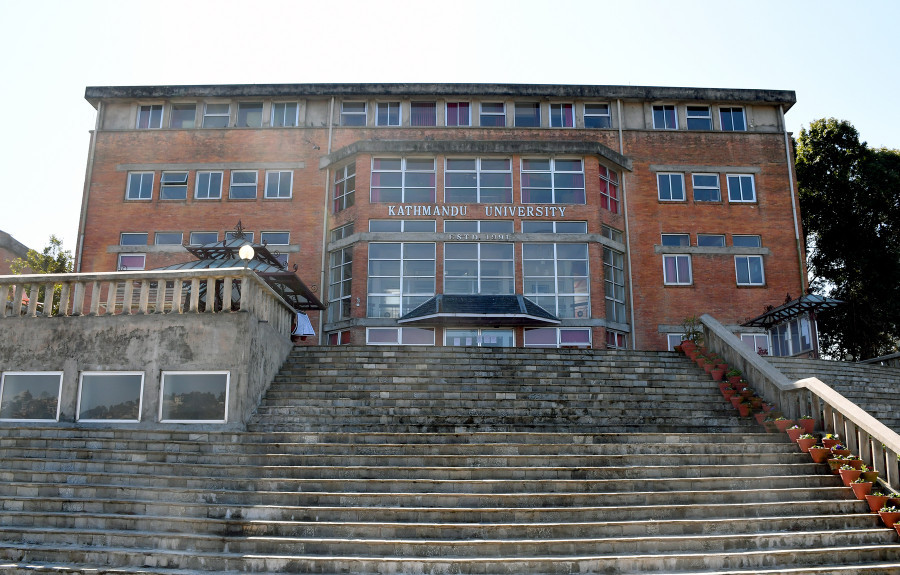National
Call for criteria to select new KU vice-chancellor
The search committee will shortly start the process to shortlist three candidates, one of whom will succeed Ram Kantha Makaju.
Binod Ghimire
As a search committee formed to recommend names of vice-chancellor candidates for Kathmandu University plans to start the selection process within a week, the incumbent and former university officials have demanded for a standard selection criteria.
The 88th senate meeting of the university on December 29 had formed a three-member search committee, led by Minister for Education Krishna Gopal Shrestha, to find a successor to incumbent KU Vice-chancellor Dr Ram Kantha Makaju, whose term expires on January 21.
Daman Nath Dhungana, chair of the Board of Trustee at the university, and Suresh Raj Sharma, former vice-chancellor at the university, are two other committee members.
The committee will recommend three names of potential vice-chancellor and Prime Minister KP Sharma Oli, as an ex-officio university chancellor, will pick one of the candidates to lead the varsity.
But before the committee starts its selection process, the incumbent and former university officials have called for a standard selection criteria in view of the controversies the KU has faced over Makaju’s appointment and the way he led the university.
Tanka Nath Sharma, former dean at the KU School of Education, said since the university’s reputation was smirched by various controversies in the last eight years, the search committee must recommend candidates who can elevate the eminence and dignity of the university.
“Suresh Raj Sharma and his team have made immense contributions to establish the university and turned it into a prestigious institution ,” Sharma told the Post. “The committee must recommend candidates who can continue KU’s legacy, something that Makaju could not do.”
The search committee is set to hold its first meeting within a week to discuss the candidates.
Sharma, the former KU vice-chancellor, said they will have a preliminary discussion in the meeting, where Minister Shrestha will recommend some of the candidates while he and Dhungana will recommend theirs.
“The committee will have a couple of sittings before deciding the candidates,” he told the Post. “We will recommend the names of the most deserving candidates, those who are capable and competent to lead the university.”
Sharma and Dhungana were also involved in the previous recommendation committees that had proposed Makaju’s name in 2012 and 2017.
In 2017, several university officials had demanded that the committee draw up criteria for selecting vice-chancellor candidates. But it was not followed.
“The search committee has the opportunity to correct its past mistake,” Bipin Adhikari, former dean at the KU School of Law, told the Post. “There should be a justification behind every name recommended by the search committee.”
Makaju, the incumbent vice-chancellor, led the varsity for two terms, which observers say was enough to execute his plan and policies. They say the leadership should now be given to someone who can run the university in a better way.
Sharma, the former vice-chancellor, said while Makaju deserves all the credit for turning Dhulikhel Hospital into one of the best community hospitals in the country, he failed to lead the university.
“Politicisation increased during his tenure while several of his decisions were controversial,” Sharma said. “He has been accused of nurturing groupism and targeting his dissidents.”
Makaju succeeded Sharma as the KU vice-chancellor in 2012 and he was reappointed in January 2017.
At the time of his appointment in 2012, there were allegations that Makaju got the position on the condition of granting the KU affiliation to Birat Medical College in Morang and Devdaha Medical College in Rupandehi.
The two medical schools were eventually allowed to conduct MBBS courses as the university’s extended programme.
Talking to the Post in December 2014, Makaju had said that the two medical schools would operate entirely under the KU—that their students would submit their fees to the university and the university would directly oversee the appointment of faculty members.
However, after paying the first fee instalment to the university, both medical colleges started operating as independent entities.
In an interview with the Post in January last year, Makaju had rubbished the allegations against him and claimed that the university had progressed under his leadership.
Meanwhile, questions are also being raised over the search committee itself.
During last week’s senate meeting of the Kathmandu University Professors’ Association, senate members had expressed reservation over Sharma and Dhungana’s repeat involvement in the search committee.
This is the third time Sharma has been picked in the committee. For Dhungana, it is the sixth time.
“Why should the same people always be in the search committee,” Bivek Baral, chairperson of the association, told the Post. “We wanted Bhadra Man Tuladhar, founding registrar at the university; Kedar Bhakta Mathema, former vice-chancellor of Tribhuvan University; or Mana Prasad Wagle, former dean at the university, in the committee.”




 17.12°C Kathmandu
17.12°C Kathmandu














